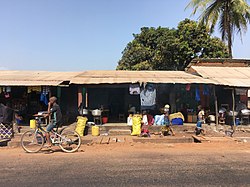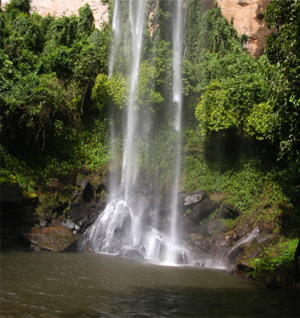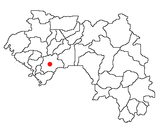Kindia
Kindia | |
|---|---|
Sub-prefecture and town | |
 | |
| Coordinates: 10°02′59″N 12°51′15″W / 10.04972°N 12.85417°W | |
| Country | |
| Region | Kindia Region |
| Prefecture | Kindia Prefecture |
| Government | |
| • Mayor | Mamadouba Bangoura |
| Population (2008) | |
| • Total | 181,126 |
Kindia (N’ko: ߞߌ߲ߘߌߦߊ߫) is the fourth largest city in Guinea, located about 85 miles (137 km) northeast of the nation's capital, Conakry. Its estimated population in 2008 was 181,126.[1] Kindia serves as the capital and largest city of Kindia Prefecture and Kindia Region. It also functions as a sub-prefecture of Guinea.
Geography
[edit]
The city is near Mount Gangan and the Mariée Falls.
History
[edit]

The city was founded in 1904 on the route of Conakry Railway in Kankan.[2]
Economy
[edit]Kindia grew around banana plantations following the construction of a now-closed railway to the capital.
Demography
[edit]The city of Kindia has an ethnically diverse population, although the Susu make up the majority of the population, followed by the Mandinka. The city is home to virtually all of the country's ethnic groups. After the capital Conakry, Kindia is home to the second largest Sierra Leonean community in Guinea. An estimated 9,000 Sierra Leoneans reside in the city, many of them have obtain Guinean citizenship. Like every city in Western Guinea, including the capital Conakry, the Susu language is the most widely spoken language in Kindia and is understood by virtually the entire population.
Climate
[edit]Kindia has a tropical savanna climate (Köppen climate classification Aw).
| Climate data for Kindia (1991–2020) | |||||||||||||
|---|---|---|---|---|---|---|---|---|---|---|---|---|---|
| Month | Jan | Feb | Mar | Apr | May | Jun | Jul | Aug | Sep | Oct | Nov | Dec | Year |
| Mean daily maximum °C (°F) | 32.5 (90.5) |
34.7 (94.5) |
35.9 (96.6) |
35.3 (95.5) |
32.7 (90.9) |
29.6 (85.3) |
27.9 (82.2) |
27.4 (81.3) |
28.8 (83.8) |
29.8 (85.6) |
30.8 (87.4) |
31.7 (89.1) |
31.4 (88.5) |
| Daily mean °C (°F) | 26.2 (79.2) |
27.7 (81.9) |
28.7 (83.7) |
28.7 (83.7) |
27.3 (81.1) |
25.4 (77.7) |
24.4 (75.9) |
24.1 (75.4) |
24.8 (76.6) |
25.3 (77.5) |
25.9 (78.6) |
25.8 (78.4) |
26.2 (79.2) |
| Mean daily minimum °C (°F) | 19.9 (67.8) |
20.6 (69.1) |
21.6 (70.9) |
22.1 (71.8) |
21.9 (71.4) |
21.2 (70.2) |
20.8 (69.4) |
20.8 (69.4) |
20.8 (69.4) |
20.8 (69.4) |
21.1 (70.0) |
19.9 (67.8) |
21.0 (69.8) |
| Average precipitation mm (inches) | 1.6 (0.06) |
3.5 (0.14) |
10.7 (0.42) |
63.9 (2.52) |
165.6 (6.52) |
262.3 (10.33) |
380.4 (14.98) |
481.5 (18.96) |
363.3 (14.30) |
239.1 (9.41) |
51.6 (2.03) |
2.6 (0.10) |
2,026.1 (79.77) |
| Average precipitation days (≥ 1.0 mm) | 0.3 | 0.3 | 0.9 | 4.0 | 10.3 | 16.0 | 21.6 | 25.9 | 22.0 | 17.1 | 3.6 | 0.2 | 122.2 |
| Average relative humidity (%) | 47 | 45 | 48 | 55 | 69 | 80 | 84 | 86 | 82 | 80 | 73 | 57 | 67 |
| Mean monthly sunshine hours | 247 | 237 | 262 | 230 | 197 | 148 | 106 | 81 | 127 | 163 | 189 | 236 | 2,223 |
| Source: NOAA (humidity, sun 1961–1990)[3][4] | |||||||||||||
References
[edit]- ^ World Gazetteer [dead link], Retrieved on June 16, 2008
- ^ Britannica, "Kindia", britannica.com, US, accessed on June 23, 2019
- ^ "World Meteorological Organization Climate Normals for 1991-2020 — Kindia". National Oceanic and Atmospheric Administration. Retrieved January 4, 2024.
- ^ "Kindia Climate Normals 1961–1990". National Oceanic and Atmospheric Administration. Retrieved July 6, 2015.


